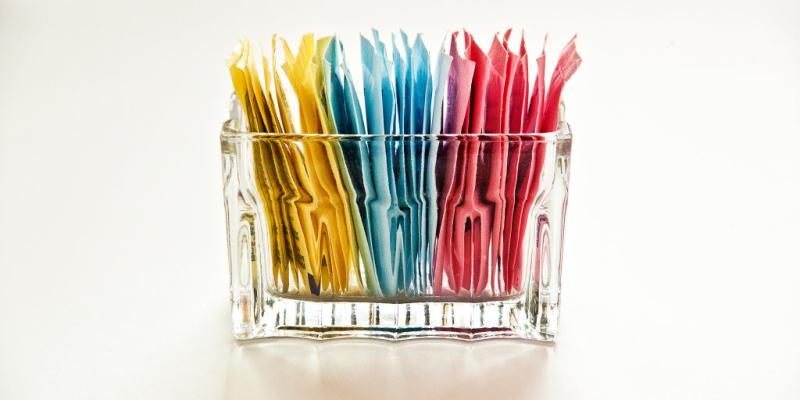Artificial sweeteners may raise risk of heart disease, elevate blood sugar



New research adds to mounting evidence that artificial sweeteners may be harmful to your health.
A study published Wednesday in the BMJ, which involved more than 100,000 adults in France, found a potential link between consumption of artificial sweeteners and heart disease.
The results showed that participants who consumed large amounts of aspartame — found in the tabletop sweeteners Equal and NutraSweet as well as cereals, yogurt, candy and diet soda — had a higher risk of stroke than people who didn't consume the sweetener.
Similarly, people who consumed high quantities of sucralose — found in Splenda as well as baked goods, ice cream, canned fruit, flavored yogurtand syrups — and acesulfame potassium, often used in "sugar-free" soda, had a higher risk of coronary heart disease.
"Artificial sweeteners may not be a safe alternative to sugar," said Mathilde Touvier, the study's author and a research director at the French National Institute for Health and Medical Research.
Last month, a smaller study found that consuming non-nutritive sweetener — sugar substitutes that contain few calories or nutrients — could alter a person's gut microbes and potentially elevate blood sugar levels. High blood sugar can increase one's risk of diabetes, heart disease or stroke.
Prior to that, a June lab study found that artificial sweeteners prompted gut bacteria to invade cells in the intestine wall, which could ultimately raise one's risk of infection or organ failure.
Other previous research has linked artificial sweeteners to obesity, high blood pressure, diabetes and increased cancer risk as well.
"The more data that comes out showing these adverse health effects, the less we're going to want to encourage people to switch from added sugars to non-nutritive sweeteners," said Dr. Katie Page, an associate professor of medicine at the University of Southern California.
But the healthiest course of action, Page said, isn't to opt for regular sugar instead.
"We really need to encourage people to eat sugar in more moderation and try to decrease sugar consumption," she said. "And the way to do that isn't to consume more non-nutritive sweeteners."
Some sweeteners thought of as natural aren't preferable either, Page said.
"I definitely would not switch to agave," she said. "I know people think that's healthy, but it actually has a very high fructose content."
An emerging link between sweeteners and heart disease
As a category, artificial sweeteners are low- or no-calorie additives often found in soft drinks and other highly processed foods like yogurt, granola bars, cereal or microwaveable meals. They're also sold as tabletop sweeteners like Equal, Splenda, Sweet 'N Low and Truvia.
The sweeteners were originally billed as a healthier replacement for sugar, which is known to promote obesity and diabetes and can increase one's risk of heart disease if consumed in excess.
Touvier said her study is the first to directly assess how overall dietary consumption of artificial sweeteners impacts one's risk of heart disease. Previous studies mostly looked at how artificially sweetened beverages impact heart disease risk.
Her team defined a large amount of sweetener as around 77 milligrams per day, on average, which is a little less than two packets of tabletop sweetener.
More than half of the participants' artificial sweetener consumption came from soft drinks, while 30% came from tabletop sweeteners. Another 8% came from sweetened dairy products like yogurt or cottage cheese with fruit topping.
Sucralose is the most commonly consumed artificial sweetener worldwide, Page said, whereas "aspartame has kind of gotten out of favor, so people aren't consuming it as much."
She said sodas are the biggest source of artificial sweeteners in our food supply, though "a lot of the non-nutritive sweeteners people are consuming are coming from foods that you might think of as healthy."
Two prime examples: flavored yogurts and sports drinks.
The best alternative to sugary food, Page said, is naturally sweet fruit. If water isn't a satisfying substitute for soft drinks or juice, she suggested carbonated water without artificial sweeteners.
Sweeteners could disrupt your metabolism and elevate blood sugar
A growing body of research suggests that artificial sweetener may disrupt the body's ability to properly metabolize glucose, which can be a risk factor for diabetes and cardiovascular health issues.
For the study published last month, Israeli researchers asked 120 people to consume four artificial sweeteners — aspartame, saccharin, stevia and sucralose — for two weeks. Participants consumed six sachets of sweetener per day, which is within the Food and Drug Administration's acceptable intake.
The researchers observed changes in the makeup and function of participants' gut microbes, which help break down food and ward off disease-causing bacteria. The changes were not seen in people who did not consume artificial sweeteners.
"All four sweeteners changed the microbiome, each in their unique way," said Eran Elinav, the study's author and a microbiome researcher at the Weizmann Institute of Science.
Two sweeteners in particular, sucralose and saccharin (found in Sweet 'N Low), altered some people's ability to process glucose.
"It changed the way the bugs in their gut are functioning and that, in turn, led to increases in their glucose levels, which is of course not a good thing," Page said.
The researchers even transferred samples of gut microbes from the study participants with significant metabolism changes into mice. The mice, too, developed blood sugar alterations, Elinav said.
"That's pretty good evidence suggesting that [artificial sweeteners] have some type of effect on metabolism and on the gut microbiome," Page said.
Page said her team is now studying how artificial sweeteners affect children's risk of metabolic conditions like diabetes.
"There's been very, very few studies in children and there's data showing that the increases in non-nutritive sweetener consumption are even higher among children and adolescents," she said.

Tags
Who is online
51 visitors

No mention of honey.
Honey is natural and developed over a hundred million years along side the life forms that create it and consume it.
Artificial anything, having unintended consequences on natural life forms, should surprise no one.
I am here baby.
Haha I don't think I even have any honey. I admit I put a little sugar in coffee. Never used artificial, don't like the taste.
I am not fond of sweets, so I don't use sugar or any artificial sweeteners. I take my coffee black and my tea unsweetened. The only sweet thing I like is ice cream, and then only rarely. Honey is a non-doable at any time and/or in anything. It doesn't like me.
you're sweet enough, that would be overkill...
I guess even gut microbes find artificial sweeteners to be sweet?
I never needed a study to convince me that replacing natural sweeteners (which shouldn’t be consumed often anyways) with lab created versions is a bad idea. Ditch the sweet tooth and embrace the world of savory and umami.
I was on a very simple diet for a very long time consisting of brown rice with steamed broccoli, steamed chicken, steamed fish or tofu. It's amazing how your tase buds zero in on the simple flavors and you are satisfied with less bells and whistles.
Getting married changed my diet. I was unable to sell it to the love of my life.
I never use sugar or artifical sweeteners. If I want to add some sweetness to coffee or anything else I use raw honey.
Same here.
I don't know how beneficial it is but most of the farmers markets here sell local TX honey with a bit of the comb in it and we eat it too.
Bears don't mind, why should we?
What I don't understand is raw honey. It is said to not need pasteurization. But how come? Honey comes from the 'nasty' hive of insects, right? What 'antiseptic' property does bees present in honey?
Bears I can understand processing raw meats and etceteras. Humans? Not so much?
Honey does not provide an environment for bacteria to grow. High sugar content, low water and hydrogen peroxide.
Honey in wound and burn management predates the Egyptians and the Greeks but they were the first to commit honey facts to paper, papyri and hieroglyphs.
Or their works were the first to survive in our era.
Wow! I never read/understood this. Thank you!
This Saturday (tomorrow) I will go out and get a personal jar of honey and eat some daily!
I recommend organic raw honey.
Note, honey will crystalize with age. No problem. It is still good. Warmth will melt it back to honey consistency.
Arvo split...we use Manuka honey here...has extremely strong anti bacterial qualities and is used in hospitals for burns, leg ulcers and open wounds...it has to be treated a certain way and not something you buy of the shelf in Woolies to put on toast etc..
The Kooris have used it for ages in Australia (though the Kiwi's) have tried to poach it...
It is a certain type of bush (Melaleuca) the bees go for here that produces it's unique qualities...and it works extremely well.
Got it! Thanks for this powerful tip! Tomorrow it is.
Tomorrow it is.
Arvo CB ..Or in my case that will be today...🤣
Hi Shona1! I have read that word, "Melaleuca" somewhere I will look for it in stores too! Especially if it is organic! Good night, all!!!
Good night, all!!!
I got some honey (for myself) from the store today: Pacific Coast Organic Honey 100 %. It's not Melaleuca-based.
To Cal's health!
I appreciate that! After so many years (five plus) of equal, I will began to wean myself (and one other important family member) off of Equal. Looking to the added properties of honey for our morning 'beverage'!
After so many years (five plus) of equal, I will began to wean myself (and one other important family member) off of Equal. Looking to the added properties of honey for our morning 'beverage'!
Now we have to keep the bees healthy.
Yes, that indeed!
Evening CB..I am sure it will be fine and I hope you enjoy it...
Can't beat fresh bread, butter and honey..
Best thing out since sliced bread.
Yummies!
I will keep my eyes open for the Manuka brand in my parts to give it a try as well.
We plant flowers for the bees. My rose of sharon finally did well after some much needed rain. The honeybees are all over that shrub
Guilty! I use 2 Equals everyday in my coffee for many years now (since told I was pre-diabetic); I love my Gatorade Zero(s) one with evening dinner as a substitute to sweet beverages. I wish these people can get their "studies" together because I damn near consume small quantities of food and drink as it is. In fact, so few that sometimes I laugh because I have become a 'one-trick pony' at breakfast and dinner. That is, less(er) food and variety is. . . languishing. (And I know that is not good!)
I have been warned to watch out for heart disease and faithfully use a statin drug.
Honey? We have it. I use it at times. May start to use it more. Regular processed sugar—it's in almost everything up to the eyeballs. Our shelf foods are so overly processed and questionably unhealthy!
Well. . . here I go, here I go, here I go (again): Back on the 'circuit' of is it okay or is it not okay for me to eat this or that!
Perrie! Thank you for this. Lots for "this guy" to consider/ponder/reckon with!
Damn those scientists. I use one packet of Equal (equivalent of 2 teaspoons of sugar) in my 2-cup sized mug of coffee at breakfast every day, and drink a bottle of diet Pepsi every few days. Now, having already reached the age of 85 I have to start worrying. Every little while some study comes out to tell us we're going to die if we eat or drink some common thing - I expect they will tell us soon that drinking water is dangerous.
I hear you and I "feel" you! I am going to go out and get a personal honey jar for myself and reduce my Equal gradually. I think it is time now (after so many years of Equal) to try something a tad different.
Eat drink and be merry...life is short..enjoy!!
We are all going to cark it (die) from something, so may as well enjoy it while you can...
Live long and prosper!!🤣🤣
There was a good book about sugar and the health problems it causes written around a decade ago:
Fat Chance: Beating the Odds Against Sugar, Processed Food, Obesity, and Disease
It's a good read. See if you can download the kindle version from your public library.
(FWIW, the author did not recommend honey as a healthy alternative to sugar.)
The only artifical sweetener I will bow to is that used in sugar free gum. I chew sugar free because of my teeth. Other than that I don't artificial anything. I hate diet soda
I loved diet soda until I deferred to Gatorade Zero as a vouchsafe for which I am satisfied drinking one bottle a day. But, due to this discussion I am looking at my 'daily' askance as it has Sucralose and Acesulfame K. All of this is "controversial" and confusing. On one hand we have a great many things to consume all day; on the other hand our food stocks are 'timebombs.'